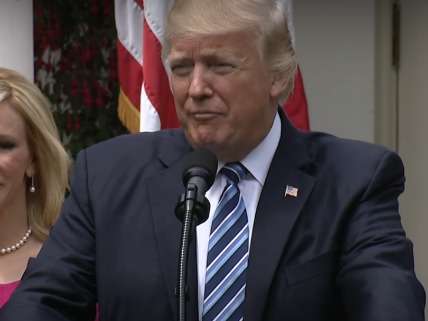Outraged by Politically Motivated DOJ Probes, Trump Orders One
The president thinks the distinction between justice and politics is for suckers.

If the Obama administration used an informant to spy on Donald Trump's presidential campaign "for political reasons," the president said last Friday, it would be the "all time biggest political scandal." Two days later, Trump announced his intention to "demand" that the Justice Department "look into" that possibility. Trump's motivation—discrediting special counsel Robert Mueller's investigation of ties between his campaign and the Russian government—was clearly political. But as far as Trump is concerned, there was nothing even faintly scandalous about his demand.
"When the president does it," Richard Nixon famously told David Frost, "that means that it is not illegal." Trump has added his own corollary: "When Donald Trump does it, that means it is not improper." Trump understands that there is supposed to be a distinction between justice and politics, that the DOJ's tradition of independence helps preserve that distinction, and that presidents are not supposed to treat the department as a tool for punishing their enemies and protecting their friends, even though the Constitution gives them the power to do so. He just does not want to play by those rules.
"I am not supposed to be involved with the Justice Department," Trump complained in a radio interview last November. "I'm not supposed to be involved with the FBI. I'm not supposed to be doing the kind of things I would love to be doing, and I am very frustrated by it."
At the time Trump was "very unhappy" that the FBI was not "going after Hillary Clinton with her emails and with her dossier," meaning the opposition research that the Clinton campaign and the Democratic National Committee paid former British spy Christopher Steele to produce. The bee currently in Trump's bonnet is the FBI informant who reportedly contacted three Trump campaign advisers (Carter Page, Sam Clovis, and George Papadopoulos), apparently in an attempt to assess the extent of their links to the Russian government.
Although Trump offered no evidence that the informant's activities were illegal or inappropriate, Deputy Attorney General Rod Rosenstein tried to placate him by asking the DOJ's inspector general, Michael Horowitz, to look into the matter. Horowitz is already investigating whether the FBI improperly relied on the Steele dossier in seeking warrants to eavesdrop on Page under the Foreign Intelligence Surveillance Act. "If anyone did infiltrate or surveil participants in a presidential campaign for inappropriate purposes," Rosenstein said on Sunday night, "we need to know about it and take appropriate action."
That gesture may give Trump a face-saving way to retreat from what sounded like a plan to order a criminal investigation that DOJ officials do not think is justified. But if push comes to shove, Trump plainly has the power to override their judgment and to fire them if they refuse to comply. As he bragged in an interview with The New York Times last year, "I have [an] absolute right to do what I want to do with the Justice Department."
The fact that he has the right to open or close investigations at will, of course, does not mean he would be right to do so. In an upcoming article, Fordham University law professor Bruce Green and New York Law School professor Rebecca Roiphe argue that "the Department of Justice is independent of the President, and its decisions in individual cases and investigations are largely immune from his interference or direction." That situation, they say, "does not result from any explicit constitutional or legislative mandate" but is instead "based on an evolving understanding of prosecutorial independence and professional norms," which serve as "a fundamental check on presidential power."
Trump clearly has no respect for those norms, except insofar as violating them hurts him politically. Hence his angry incomprehension when Attorney General Jeff Sessions recused himself from the Russia investigation, which led to Rosenstein's appointment of Mueller. Sessions' loyal service to the Trump campaign, which was the reason for his recusal, was the very reason that Trump thought he could count on Sessions to "protect" him. Trump's periodically erupting rage at this perceived betrayal suggests he is genuinely puzzled by the notion that Sessions recused himself as a matter of principle, based on his honest understanding of DOJ regulations.
Trump nevertheless has not fired Sessions, or Rosentein, or Mueller. The fallout from his dismissal of FBI Director James Comey may have convinced him it is not always wise to act on his angry impulses. If he is not careful, the spectacle of an unhinged, unprincipled president treating the DOJ as his personal law firm may yet persuade voters, or even members of Congress, that Trump does not belong in the White House. Like the president, they have an absolute right to fire an official whose performance displeases them.


Show Comments (151)